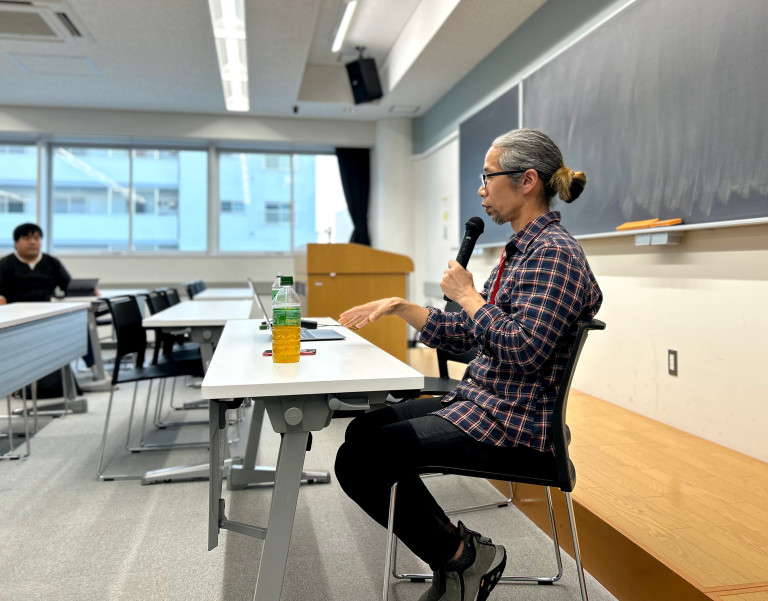
Our reporter shows young and aspiring writers what’s really important.
On October 16, our Japanese-language reporter Mr. Sato was invited to be a guest speaker at a special class of the liberal arts department of Nihon University College of Art. As someone who never went to college, having jumped between part-time jobs after graduating from his vocational high school, he felt immensely honored to be specifically invited by a professor with experience in writing.
What did he have to say, and how did he feel speaking to the youth of today? Let’s hear from the man himself.
Write, Write
by Mr. Sato
I’m not much for sophisticated public speaking, but I had one thing I really wanted to convey to the students, and that was, “If you try, you can do it.” Those students are far more brilliant than I am, so I wanted them to know that as long as they didn’t give up, they could achieve anything.
Prior to the class, I thought back on where I was when I was the same age as those students. When I was 19 and 20, my thinking was really twisted (and you can still see hints of that today). People didn’t like to be around me; I just wasn’t happy. In today’s terms, you might even say that I had a mental illness.
Because I was young, I didn’t think of myself as reliable. I doubted myself constantly, and every day I faced the fact that I had no idea how to live. In other words, I felt completely powerless. I believed that, no matter what I did, I would never become myself, and I absolutely hated myself for being that helpless.
Every second of every day, from the time I woke up, to the time I went to sleep, I hated myself.
Many of the adults in my life would simply tell me the same things over and over again. “You’re overthinking it,” they said, or “Stop worrying about it.” I hated that too. I even thought everything would be fine if I just disappeared. If that’s not depression, then I don’t know what is.
The one thing that offered a tiny modicum of support was writing. When I was in high school, I had a vague dream of becoming an author, but for my depressed self, that dream was a crutch, the only thing keeping me moving.
This was in the late ’90s, when the Internet wasn’t widely available yet, so I would spend every day recording how I felt on paper. This was the outlet for my pent-up feelings. I filled multiple notebooks with my thoughts. No one would ever see them, but I kept writing, writing, writing.
“You’re overthinking it,” the adults would say to me, and I know now that was their way of trying to be nice, but at the time, I could only think of them as annoying. But there was one adult I really respected, the owner of a certain bar who listened to me, who heard the things I said underneath my vulgar, childish words.
He would often tell me, “Just do it.” If you want to do it, just do it. I think that was his philosophy. And I don’t know if I can describe how it felt to tell someone how I felt without being interrupted and disagreed with. “Just do it” became my new crutch.
It’s been 30 years, and now I’m one of the adults. And what’s more, I’ve been invited to take up the podium as a guest speaker at a university.
Many of the students in the class dream of becoming authors. The class itself is about the craft of writing, so I didn’t think there was much that I could say that would really be useful to them. But even so, writing is something close to me, so I decided to do my best to have something practical to say.
For example, I told them that “small discoveries and realizations are key.” Don’t allow yourself to think of them as stupid and discard them. Hold them in high esteem. I believe that, in this age of information, anything overlooked, no matter how small, has value. I asked them to always keep that mindset.
I also made sure to tell them that any experience they have while they’re young will be useful later in life. In this day and age, you never know when you might lose your job. That applies to me too. If I happened to lose my job, I know that I can go back to the things I did before (like bartending, security, deliveries, and temporary work).
Without experience, you’ll hesitate to try. Becoming unemployed in my forties and fifties and trying to find new work in an unknown world is difficult, but not impossible. Whether or not they choose to hire me, it’s a strong comfort to know I have places (jobs) to fall back on.
“You’re going to keep on experiencing new things,” I said. “So I want you to experience as much as you can.” Whatever you do is a bonus. You can’t get the time back, so if you want to do something, do it. Don’t look back and think “I wish I’d done that.”
There was one final thing I told them: try to earn some money with your writing, even just a little. When you earn money, you gain responsibility. You should be able to make strides in this world if you write what you like how you like it. And even if money isn’t everything, taking on responsibility lets you open up your world. Feel that pressure as you send your writing out into the world. I’m sure you’ll see far more of the world than you see now.
You might not know who you are yet, or what you want to do. You may have no idea. Maybe you don’t know how to get your dream job, either, or even if you have the courage to put your work out there. Even so, as long as you don’t give up, you should be able to achieve what you want. I had a vague dream of becoming an author, but even though I’m not an author, I get to work as a writer. If I can do that, you can do so much more.
Just do it, whatever it is.
Write. Write. Keep writing.
—
Not much for public speaking, he says! Mr. Sato has proven once again that he can inspire the masses. Hopefully his words have encouraged you, too, even if your dream isn’t to be a writer.
If you or someone you know is in Japan and having suicidal thoughts, there are people here to help. Click here for more info.
Images © SoraNews24
● Want to hear about SoraNews24’s latest articles as soon as they’re published? Follow us on Facebook and Twitter!
[ Read in Japanese ]

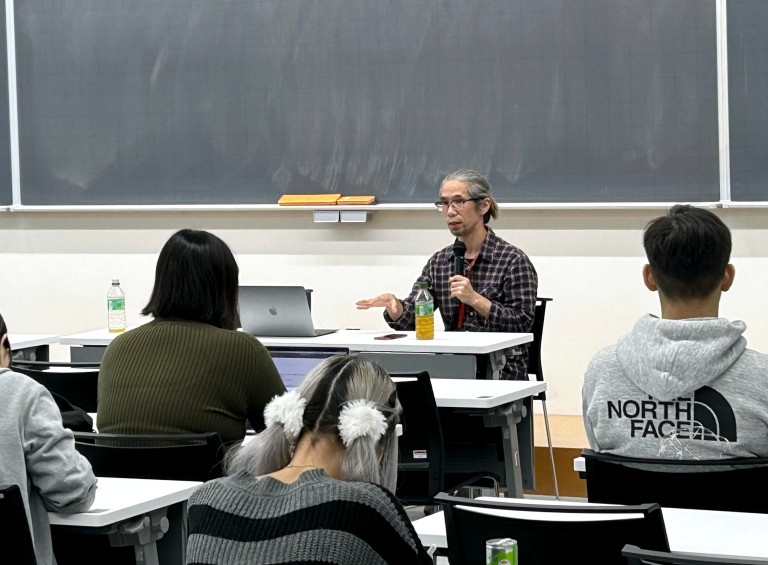
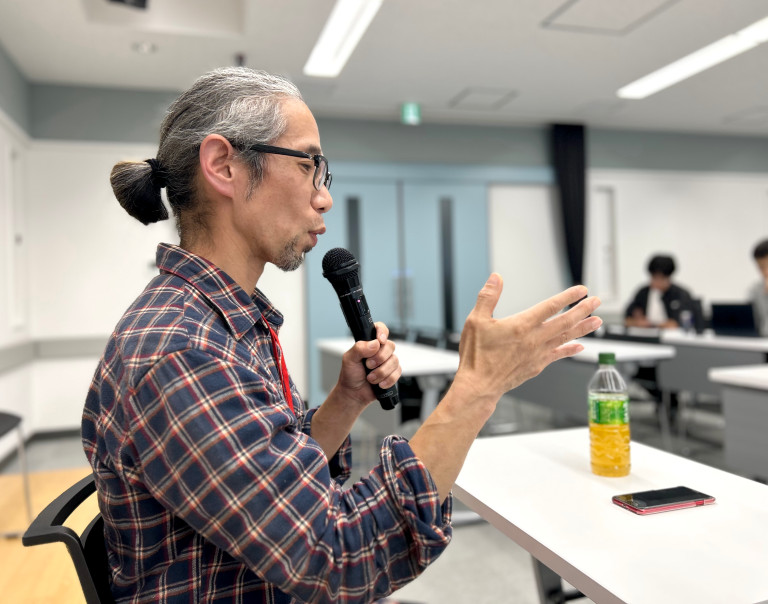
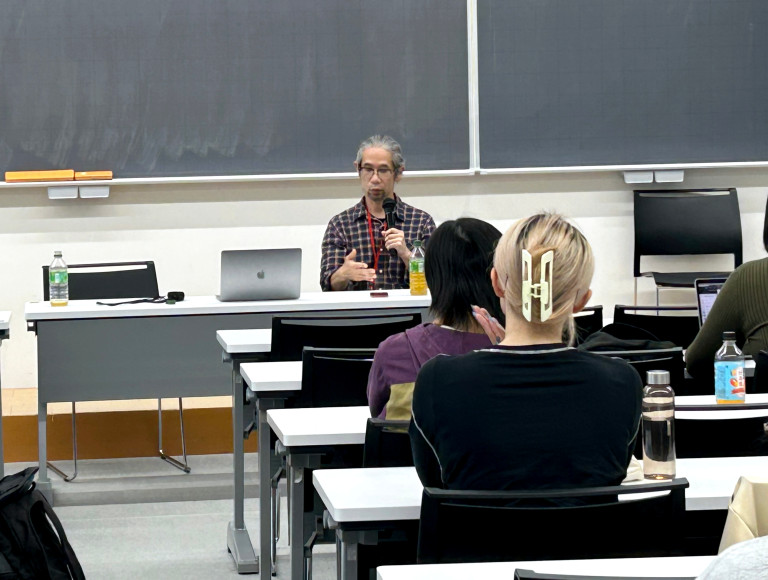
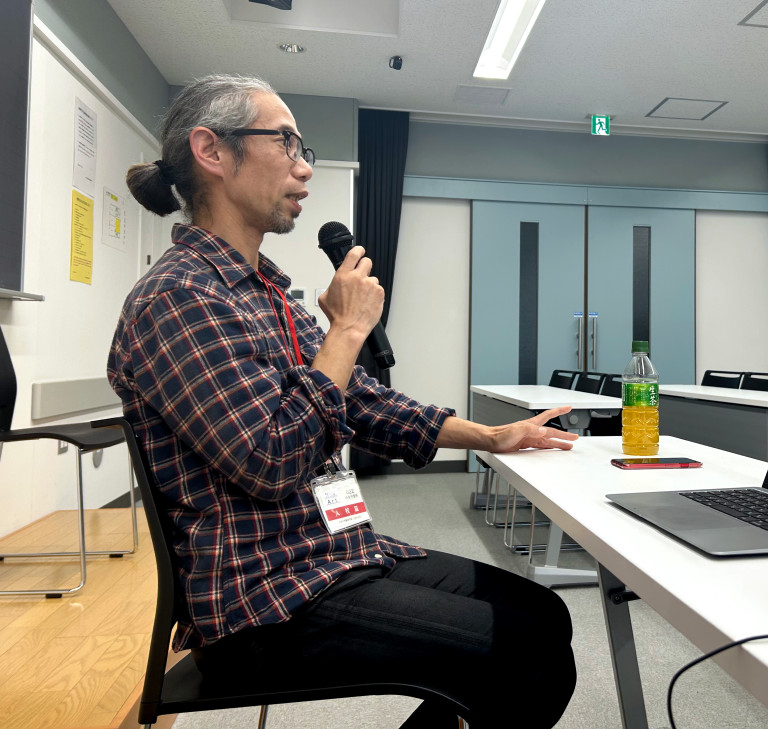
 Confessions of a 46-year-old Japanese male pole dancer
Confessions of a 46-year-old Japanese male pole dancer How do Japan’s host club hosts get their professional names? We talk with five Kabukicho pros
How do Japan’s host club hosts get their professional names? We talk with five Kabukicho pros Can our writers’ taste buds pick out the luxury kamaboko fish cake from these two?
Can our writers’ taste buds pick out the luxury kamaboko fish cake from these two? We visit Tokuyama’s Cockroach Fest to take on the “Cockroach Encounter”【Photos】
We visit Tokuyama’s Cockroach Fest to take on the “Cockroach Encounter”【Photos】 Can our foodie reporters tell the difference between two brands of tofu with a huge price gap?
Can our foodie reporters tell the difference between two brands of tofu with a huge price gap? Foreigner’s request for help in Tokyo makes us sad for the state of society
Foreigner’s request for help in Tokyo makes us sad for the state of society Seaside scenery, history, and so many desserts on Yokohama’s Akai Kutsu【Japan Loop Buses】
Seaside scenery, history, and so many desserts on Yokohama’s Akai Kutsu【Japan Loop Buses】 Mikado Coffee is a 76-year-old coffee chain with a major celebrity connection
Mikado Coffee is a 76-year-old coffee chain with a major celebrity connection Japan’s massive matcha parfait weighs 6 kilos, contains hidden surprises for anyone who eats it
Japan’s massive matcha parfait weighs 6 kilos, contains hidden surprises for anyone who eats it Japanese city loses residents’ personal data, which was on paper being transported on a windy day
Japanese city loses residents’ personal data, which was on paper being transported on a windy day Suntory x Super Mario collaboration creates a clever way to transform into Mario【Videos】
Suntory x Super Mario collaboration creates a clever way to transform into Mario【Videos】 Hey, Japanese taxi driver! Take us to your favorite restaurant in Tsuruga City!
Hey, Japanese taxi driver! Take us to your favorite restaurant in Tsuruga City! We eat at three Japanese family restaurants to find the one with the best-value breakfast
We eat at three Japanese family restaurants to find the one with the best-value breakfast This is the first cafe in Japan to serve Mont Blanc, and it’s closing down after 90 years【Taste test】
This is the first cafe in Japan to serve Mont Blanc, and it’s closing down after 90 years【Taste test】 There’s a new world’s largest anime robot statue, and it’s not in Japan【Photos】
There’s a new world’s largest anime robot statue, and it’s not in Japan【Photos】 McDonald’s new Happy Meals offer up cute and practical Sanrio lifestyle goods
McDonald’s new Happy Meals offer up cute and practical Sanrio lifestyle goods Japanese ramen restaurants under pressure from new yen banknotes
Japanese ramen restaurants under pressure from new yen banknotes French Fries Bread in Tokyo’s Shibuya becomes a hit on social media
French Fries Bread in Tokyo’s Shibuya becomes a hit on social media Red light district sushi restaurant in Tokyo shows us just how wrong we were about it
Red light district sushi restaurant in Tokyo shows us just how wrong we were about it New private rooms on Tokaido Shinkansen change the way we travel from Tokyo to Kyoto
New private rooms on Tokaido Shinkansen change the way we travel from Tokyo to Kyoto Tokyo Tsukiji fish market site to be redeveloped with 50,000-seat stadium, hotel, shopping center
Tokyo Tsukiji fish market site to be redeveloped with 50,000-seat stadium, hotel, shopping center Beautiful Ghibli sealing wax kits let you create accessories and elegant letter decorations【Pics】
Beautiful Ghibli sealing wax kits let you create accessories and elegant letter decorations【Pics】 Secret Kitchen bento serves Japanese flowers, birds, wind and moon in a box, but is it worth it?
Secret Kitchen bento serves Japanese flowers, birds, wind and moon in a box, but is it worth it? New definition of “Japanese whiskey” goes into effect to prevent fakes from fooling overseas buyers
New definition of “Japanese whiskey” goes into effect to prevent fakes from fooling overseas buyers Our Japanese reporter visits Costco in the U.S., finds super American and very Japanese things
Our Japanese reporter visits Costco in the U.S., finds super American and very Japanese things Studio Ghibli releases Kiki’s Delivery Service chocolate cake pouches in Japan
Studio Ghibli releases Kiki’s Delivery Service chocolate cake pouches in Japan All-you-can-drink Starbucks and amazing views part of Tokyo’s new 170 meter-high sky lounge
All-you-can-drink Starbucks and amazing views part of Tokyo’s new 170 meter-high sky lounge More foreign tourists than ever before in history visited Japan last month
More foreign tourists than ever before in history visited Japan last month New Pokémon cakes let you eat your way through Pikachu and all the Eevee evolutions
New Pokémon cakes let you eat your way through Pikachu and all the Eevee evolutions Disney princesses get official manga makeovers for Manga Princess Cafe opening in Tokyo
Disney princesses get official manga makeovers for Manga Princess Cafe opening in Tokyo Sales of Japan’s most convenient train ticket/shopping payment cards suspended indefinitely
Sales of Japan’s most convenient train ticket/shopping payment cards suspended indefinitely Sold-out Studio Ghibli desktop humidifiers are back so Totoro can help you through the dry season
Sold-out Studio Ghibli desktop humidifiers are back so Totoro can help you through the dry season Japanese government to make first change to romanization spelling rules since the 1950s
Japanese government to make first change to romanization spelling rules since the 1950s Ghibli founders Toshio Suzuki and Hayao Miyazaki contribute to Japanese whisky Totoro label design
Ghibli founders Toshio Suzuki and Hayao Miyazaki contribute to Japanese whisky Totoro label design Doraemon found buried at sea as scene from 1993 anime becomes real life【Photos】
Doraemon found buried at sea as scene from 1993 anime becomes real life【Photos】 Tokyo’s most famous Starbucks is closed
Tokyo’s most famous Starbucks is closed One Piece characters’ nationalities revealed, but fans have mixed opinions
One Piece characters’ nationalities revealed, but fans have mixed opinions We asked a Uniqlo employee what four things we should buy and their suggestions didn’t disappoint
We asked a Uniqlo employee what four things we should buy and their suggestions didn’t disappoint We interview voice actress Shoko Nakagawa, learn what gave her the greatest shock of her career
We interview voice actress Shoko Nakagawa, learn what gave her the greatest shock of her career Polish songstress releases debut Japanese album, shares her loves and dislikes about Japan
Polish songstress releases debut Japanese album, shares her loves and dislikes about Japan “My father was arrested”—Student’s award-winning essay tells the story of a crime in her family
“My father was arrested”—Student’s award-winning essay tells the story of a crime in her family Five ways college life is different in Japan and the United States
Five ways college life is different in Japan and the United States “Do you have a lot of money?” Japanese kid crushes day care worker with innocent cruelty
“Do you have a lot of money?” Japanese kid crushes day care worker with innocent cruelty “Peaceful life with many dogs” is unacceptable dream, Japanese high school teacher tells student
“Peaceful life with many dogs” is unacceptable dream, Japanese high school teacher tells student Gay Japanese Twitter user comes out to family, mother’s response moves Twitter to tears
Gay Japanese Twitter user comes out to family, mother’s response moves Twitter to tears We asked: “What are the hardest and best things about dating a Japanese person?”
We asked: “What are the hardest and best things about dating a Japanese person?” These policemen’s response to a young boy turning in a 50 yen coin he found will warm your heart
These policemen’s response to a young boy turning in a 50 yen coin he found will warm your heart Mr. Sato appears in a French photo album without his consent, goes mad with desire for vengeance
Mr. Sato appears in a French photo album without his consent, goes mad with desire for vengeance Is work more important to Japanese salarymen than their girlfriends? Survey investigates
Is work more important to Japanese salarymen than their girlfriends? Survey investigates Beat the heat with Japanese somen noodles dipped in Starbucks noodle sauce?!
Beat the heat with Japanese somen noodles dipped in Starbucks noodle sauce?! After eight years as a NEET, our reporter shares the one thing that helped him escape that life
After eight years as a NEET, our reporter shares the one thing that helped him escape that life One Piece’s creator refusing to write about his struggles could be a reason for its huge success
One Piece’s creator refusing to write about his struggles could be a reason for its huge success A visit to one of Japan’s motorcycle Shinto shrines
A visit to one of Japan’s motorcycle Shinto shrines
Leave a Reply